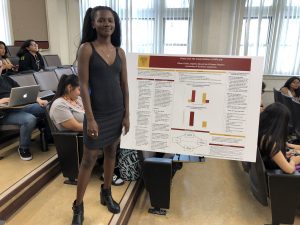Major and Classification
Psychology
Faculty Mentor
Daphna Oyserman, Ph.D., Department of Psychology
Department
Dornsife: Psychology
Research Gateway Project
“Power and The Interpretation of Difficulty”
Project Abstract
Sociocognitive research shows power’s ability to cause variation in people’s thinking and feeling behaviors. In this article, we expand on this research by investigating power’s effect on the metacognitive experience of difficulty, adopting Fisher & Oysterman’s, 2017 approach. Their difficulty perspective stipulates a person’s awareness of a difficult experience can lead them to interpret it in two ways – import or impossible – and whether or not persons adopt these two perspectives is based on their current identity. Thus, to conduct this study, it was placed under an identity-based motivation framework that argues one’s identity leads to identity-congruent behaviors, and in the case of our research, we hypothesize participants’ adherence to the interpretation of difficulty as important or impossible is due to their high or low power identity. A sample of 149 Amazon Mechanical Turk workers sense of power was manipulated by asking participants to recall either 1 (few-condition) or 7 (many-condition) incidences of power followed by two subsequent self-report measures. First, participants answered questions from the Interpretations of Difficulty Scale that assesses people’s metacognitive experience of difficulty (taken from Fisher & Oyserman, 2017). Then, workers took the Sense of Power questionnaire, which behaved as a manipulation check to ensure the Few vs. Many recall task successfully manipulated participant’s sense of power (Anderson & Joh, 2011). A Pearson’s r-correlation revealed a significant, negative relationship between participant’s sense of power and their interpretation of difficulty as an impossibility and also revealed a moderate, positive correlation between sense of power and difficultly as importance. Independent t-tests demonstrated no significant difference between MTurkers in the few (high-power) and (low-power) conditions for difficulty as important and impossible, as well as for their sense of power. Therefore, there is a need for further research on power’s relationship to difficulty interpretations, and in particular, studies on different sample populations that also may use an alternative power manipulation.”
